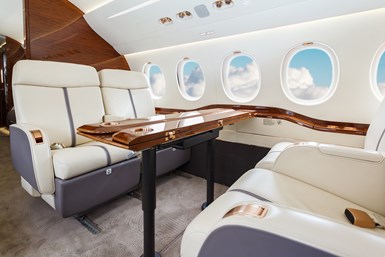Chromatic 3D Materials Meets Flammability Requirements for Aerospace Industry
NIAR testing shows that multiple polyurethanes 3D printed by Chromatic are compliant with U.S. standards for use in aircraft interiors.
Chromatic 3D Materials has passed 14 CFR vertical burn tests, which demonstrate compliance with anti-flammability standards for airworthiness. The company says its durable, abrasion-resistant thermoset polyurethanes are suitable for a wide variety of airline parts, including elastomeric components used in stowage compartments and decorative panels, as well as ductwork, cargo liners, fabric sealing and many other applications.
Testing conducted by the National Institute for Aviation Research at Wichita State University showed that multiple polyurethanes 3D printed by Chromatic are compliant with U.S. standards for use in aircraft interiors. ChromaLast 65, ChromaMotive 70 and ChromaFlow 90 each passed the 12-sec. vertical burn test necessary for use in floor coverings, textiles and cushions, decorative parts, galley furnishings, electrical conduits, insulating components, ducts, cargo liners and elsewhere. Furthermore, both ChromaLast 65 and ChromaFlow 90 passed the 60-sec. vertical burn test for interior panels, galleys and under-seat stowage areas.
Having met these crucial requirements, Chromatic can now offer the aerospace market the benefits of its RX-AM materials and technology platform for additive manufacturing (AM). The company says benefits include low tooling costs for low- and medium-volume manufacturing, as well as cost-effective prototyping and high-mix production. Moreover, it is said RX-AM makes it possible to produce high-quality components with limited material stock, enabling aerospace companies to print parts on-demand outside of traditional manufacturing environments.
“Additive manufacturing can revolutionize product design and supply chains — and it all starts with the type of materials that are available,” says Dr. Cora Leibig, Chromatic founder and CEO. “The aviation industry has some of the most stringent materials requirements, and we are pleased that test results from the National Institute for Aviation Research prove Chromatic’s materials pass with flying colors. We’re confident that our industrial-strength polyurethanes will open doors for 3D printed applications in aviation as well as other industries that require safe, flame-resistant materials, including automotive, furniture and apparel,”
Chromatic 3D Materials is a 3D-printing technology company focused on flexible, cost-effective and sustainable manufacturing of industrial-strength elastomeric products. Its portfolio includes printable polyurethanes and other thermoset elastomers for applications in transportation, industrial seals and gaskets, textiles, medical devices and defense. Chromatic’s RX-AM materials and technology platform is based on reactive extrusion AM, a type of deposition 3D printing that uses chemical reactions.
- Listen to this episode of AM Radio to learn about 3D printing as a powerful tool for repaired, replacement and upgraded parts, including tractor treads replaced with Chromatic 3D Material’s polyurethane printed directly onto steel.
- Read this News post to learn more about Chromatic 3D Materials’ RX-Flow 3D printers for reactive extrusion AM.
- Read how NIAR is helping aviation manufacturers produce AM parts faster, cheaper and more reliably than ever before – all in a heavily regulated industry.
Related Content
-
What Is Neighborhood 91?
With its first building completely occupied, the N91 campus is on its way to becoming an end-to-end ecosystem for production additive manufacturing. Updates from the Pittsburgh initiative.
-
Why AM Leads to Internal Production for Collins Aerospace (Includes Video)
A new Charlotte-area center will provide additive manufacturing expertise and production capacity for Collins business units based across the country, allowing the company to guard proprietary design and process details that are often part of AM.
-
Variable Resistance Valve Trim Achieves Lead Time Reduction Through AM: The Cool Parts Show #69
Baker Hughes is realizing shorter lead times and simplified manufacturing through powder bed fusion to produce valve trims previously assembled from many machined metal parts.















